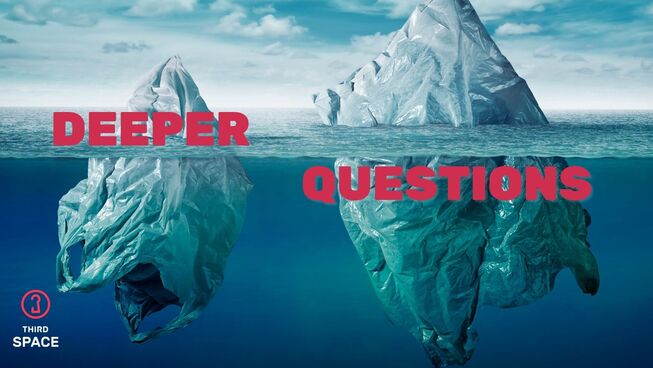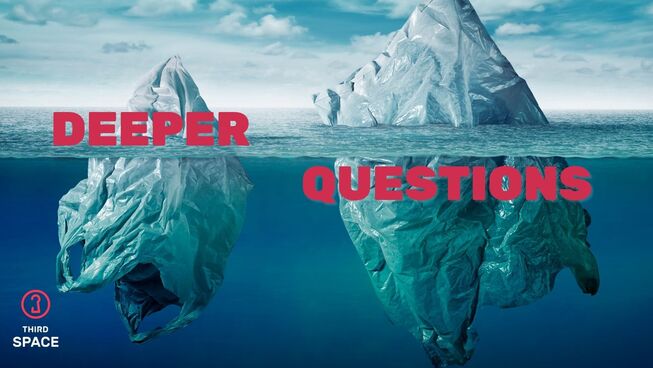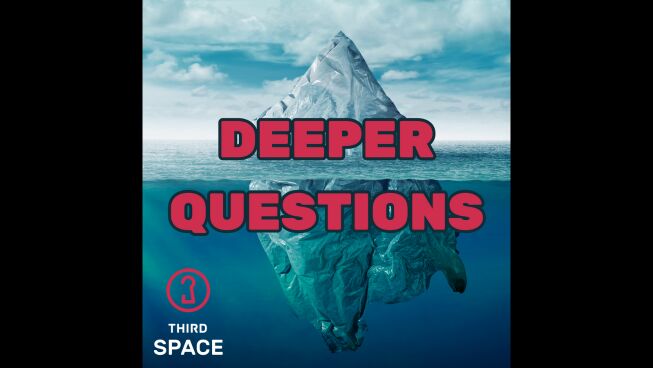The Scandinavian system (or why Atheism is a belief system)

Guest blog post from Dr. Andy Bannister, the Canadian Director and lead apologist for RZIM Canada. You can find him on the web at www.rzim.ca or on Twitter at @rzimcanada
“I don’t believe that Sweden exists,” my friend suddenly declared from across the coffee shop table. He took a sip of espresso and stared intently at me, clearly awaiting a response. I paused, my cinnamon roll halfway to my mouth, as I digested what he’d just said.
“Pardon?”
“I don’t believe that Sweden exists,” he repeated. “I think it’s just a political conspiracy, designed to motivate other European citizens to work harder. All that talk of the best health care system, the highest standard of living, of tall and beautiful people. It sounds like a myth and I’m not buying it. I don’t believe in Sweden.”
I stared at my friend silently for a moment, allowing the sounds of the coffee shop to drift over us as I pondered. In the background, the radio began playing ‘Dancing Queen’ by Abba.
“What do you mean, ‘You don’t believe in Sweden’?” I finally replied. “That’s insane. If Sweden doesn’t exist, how do you explain IKEA furniture, or the Swedish chef on The Muppet Show, or what glues Norway to Finland? That’s a staggering claim! What’s your evidence?”
“What do you mean ‘evidence’?” he asked.
“Evidence,” I said. “You must have more than just a hunch but some pretty impressive evidence for your belief. I know Sweden only has 9.5 million inhabitants, but you can’t simply deny outright that it exists!”
“Aha,” said my friend sagely, “I see your confusion. You think that my denial of Sweden is a belief. But it’s simply a non-belief and so I don’t need to give evidence for it.”
“Come again?” I said.
“Yes,” he continued, warming to his theme, “I don’t have to provide evidence for my non-belief in Atlantis, El Dorado, or Shangri-La and nor do I need to do so for my non-belief in Sweden. You I’m not making a claim of any kind—quite the opposite: I’m claiming nothing, I’m merely rejecting one of your beliefs—your belief in Sweden.”
That story was, of course, entirely fictional but the response that I described from my friend concerning his Scandinavian skepticism does have some real world parallels, especially in the way that many contemporary atheists describe their non-belief in God. As one atheist put it recently: “I don’t believe in God and I don’t need to justify this, just as I don’t need to give reasons for my non-belief in the tooth fairy or the Flying Spaghetti Monster.” The late New Atheist writer, Christopher Hitchens, put it even more succinctly when he wrote:
Our belief is not a belief.1
In recent weeks, the merry bunch of atheists who like to hang out on my Twitter feed have posted similar examples, my favourite being:
Atheism isn’t a claim. It’s just non-belief in the claim “There is a god”.
Since this idea is heard increasingly frequently, often when the atheist making it is asked to give reasons or evidence for their position, it’s worth taking the time to briefly explore six problems with the idea that atheism is not a claim or a belief—and that to argue otherwise is to place oneself on the same level as my Sweden-denying friend.
Proving Too Much
The first problem is that the statement “atheism is just non-belief in God” proves too much. What do I mean? Well, on this definition my cat is an atheist, because it does not believe in God. (I sometimes suspect cats believe they are God, but that’s another story entirely.2) Likewise potatoes and small rocks are also atheists, because they, too, do not possess a belief in a deity of any kind.
When I have pointed this out to atheists, I usually receive a response along these lines: “But a potato can’t believe anything”. To which I reply: “So you’re now saying that atheism is the lack of belief in God by a creature that has the ability to form beliefs?” This is a different claim entirely—indeed, it’s a positive claim. The atheist is now claiming to believe that the external world really exists (thus she is rejecting metaphysical idealism), that other minds exist, that the human mind can form beliefs, and that our cognitive faculties are broadly reliable.3 Each of those is a hotly debated area in philosophy.
Suddenly what looked a simple statement of non-belief (“I don’t believe in God”) has sprouted a whole series of positive claims, popping up like mushrooms after a rainstorm. I have not yet encountered an atheist who believes that positive claims do not need to be argued for (indeed, atheists are fond of crying ‘Evidence!’ whenever confronted with a religious believer) and so it is the atheist’s job to give evidence for each of the philosophical positions they are encamped on. If they are not willing to do the hard reasoning, well, then, they can take their place alongside the cat, the rock, and the potato.
Neither True, Nor False, But Meaningless
A further drastic problem arises if the atheist wishes to claim that his statement “there is no God” is not a claim or a belief—if it isn’t, then it cannot be true or false. The problem is that only claims can be true or false. It makes perfect sense to ask whether a claim like “It is raining today” or “The Maple Leafs lost again” is true or false.4 On the other hand, it is meaningless to ask whether the colour blue, a small offduty Czechoslovakian traffic warden, or the word ‘Wibble’ are true—they are not claims and thus cannot possess a truth value.
So here’s the problem for the atheist. If atheism is not a claim of any kind, then it is simply meaningless. On the other hand, if the atheist wishes to claim that his atheism is true, then that must mean that atheism is a claim, and claims need to be defended, evidence provided and reasons given. If atheists wish to join in the conversation and the debate—and I believe that they deserve their seat at the table of ideas as much as any other worldview—then they must recognise their belief for what it is and start behaving accordingly.
Belief Leads to Action
A third problem with the idea that atheism is not a claim or belief, but merely the absence of belief in God, is that absences possess no causative power. If I drop a sledgehammer on my foot, it will cause pain. Touching the screen on your iPod may cause an Abba track to play through your headphones. But a non-existent sledgehammer or non-existent iPod causes nothing (in the case of Abba songs, much to the relief of lovers of music everywhere).
When it comes to beliefs, much the same applies. Non-belief in the tooth fairy does not cause action (it might arguably cause non-action, such as not putting your teeth under the pillow when they fall out.5) For something to cause an action, it has to be a positive belief, an actual claim.
So what about atheism? It doesn’t take a lot of searching to quickly discover that atheism does indeed cause actions. For example, many Internet-dwelling atheists read skeptical websites, edit Wikipedia articles, frequent atheist discussion forums, and post anti-religious sound bites on Twitter. These are all actions, caused, one would imagine, by their atheism. Likewise, it was his atheism that caused Richard Dawkins to write his best-selling book The God Delusion and, presumably, atheism that led many enthusiastic young skeptics to buy it, causing if not much rejoicing in heaven, certainly much celebration in the North Oxford branch of whoever Dawkins banks with. For a non-belief, a non-thing, atheism looks rather busy and active and so we must be suspicious of anybody telling us atheism is nothing.
Ideas Have Consequences
A fourth hallmark of an actual belief or claim is that it has entailments, consequences that flow from holding or stating it. For example, denying that Sweden exists entails the need to find a new source of cheap pine furniture, meatballs and gravad lax.6 It also has some pretty drastic consequences for geography, requiring a redrawing of the map of Northern Europe as well as implications for politics, history, linguistics and the compilers of “Greatest Hits of the 1970s” CDs.
So what about atheism? Does the denial of God have any entailments? Yes, it does: take just one example—the concept of human rights. Modern human rights theory is based on the Judeo-Christian idea that human beings are of tremendous value and worth, because they are made in the image of God. Reject God and suddenly you have to start again, explaining why one particular creature, thrown up by the forces of time, chance and natural selection mixing and chopping atoms and chemicals for several billion years possesses inalienable rights, whereas amoeba, aardvarks and eggplants do not. Many philosophers and thinkers recognise the problem and are honest enough to admit if you dismiss God, you lose many other things, too. Listen to these words from atheist Llewelyn Powys:
It is not only belief in God that must be abandoned, not only all hope of life after death, but all trust in an ordained moral order ... We must be prepared to take our bearings without a compass and with the slippery deck of our life-vessel sliding away under our feet. Dogmatic nihilists, profoundly skeptical of all good, we are put to our resources like shipwrecked seamen. We have no sense of direction, and recognise without dispute that all beyond the margin of our own scant moment is lost.7
If Powys is right—and other atheists, including Friedrich Nietzsche, Bertrand Russell and, more recently, John Gray have argued similarly—then atheism has some entailments.8 But if it does, if denying God does indeed cause us to “throw away the compass” with Powys, to “wipe away the horizon” with Nietzsche,9 or to embrace “unyielding despair” with Russell,10 then, ipso facto, atheism is a belief because it has consequences.
Beliefs Attract Beliefs
A fifth hallmark of a belief is that it attracts other beliefs to it, in the same way that a planet draws moons into its orbit. For example, because of their beliefs about God and about Jesus Christ, most Christians have related beliefs—they believe (or should do) in human rights, in the limited ability of human progress, in justice, and in absolute moral values and duties. And so the list goes on. Likewise my Scandinavian skeptic believed in a great global conspiracy designed to prop up the myth of Sweden. Beliefs attract beliefs.
So, again, we can ask: what about atheism. Does it stand alone, stark, naked and proud—or does it attract other beliefs to it? Once again, it’s easy to see that it does. Most atheists believe in naturalism, the worldview that says that only material things exist. Many also believe in scientism, the view that science can answer any and all questions about both the natural world and the human condition. And the list goes on and on. That most atheists believe these things is not random: it’s driven by their atheism. If you believe in God, you won’t believe that physics, chemistry and biology can explain everything. If you disbelieve in God, you’re likely to pounce on materialism as the best way to keep the divine foot out of the door.
Given these additional beliefs that cluster around atheism, we’re forced to ask how a non-belief, a nonclaim, a non-thing could have such gravitational force. One of the ways that scientists have in the past detected distant planets, too remote to see by telescope, is by their gravitational effect, often seen as a ‘wobble’ in the orbit of their parent stars. In the same way, the tendency of atheism to draw other beliefs into its orbit is powerful evidence that it is a belief.
I Disbelieve, Therefore I Am
There is one final powerful piece of evidence that atheism is a belief and that is its tendency to act as an identity marker. Many people self-describe as atheists, in a way that non-believers in the tooth fairy, Atlantis or Santa Claus do not. I have never, for example, introduced myself at a party as an “Atoothfairyian” and I have no plans to start doing so. But atheists on the other hand do use their nonbelief in God as an identity marker. They proudly write ‘atheist’ or ‘free thinker’ in their social media profiles and the more zealously enthusiastic change their profile pictures to little icons of the Flying Spaghetti Monster.
Furthermore, atheists show a tendency to gather together in communities centred around their atheism. For example, they hang out online at places like RichardDawkins.Net in order to beat up on believers and remind one another how cool it is to be an atheist. They attend conferences and seminars, they buy books written by atheist gurus like Christopher Hitchens or Sam Harris,11 they have creeds and accuse those who disagree with them of heresy.12 They are even starting churches. I’m not making this up—in London, England a group of atheists have launched ‘The Sunday Service’ where every week, hundreds of people gather in a deconsecrated Anglican church to sing secular songs (like Stevie Wonder’s ‘Superstition’) and hear messages on everything from science to the importance of volunteering. They then sit around and enjoy coffee and biscuits.13
Quite how a non-belief, a non-claim, a non-thing has performed so well as an identity marker and as the kernel of community is mystifying. The much simpler suggestion is that atheism is a belief and, just like other beliefs, ranging from the political to the religious, can indeed form part of a person or a community’s identity. Atheism looks like a belief, functions like a belief and behaves like a belief—in short: it is a belief.
But can we go further than this? Could some forms of atheism even be described as a religion? Many scholars think that they can, especially the ‘New Atheist’ form of irreligion that has proven so popular of late. Listen to these words from Stephen Prothero of Boston University:
Atheism is a religion of sorts, or can be. Many atheists are quite religious, holding their views about God with the conviction of zealots and evangelizing with verve … It stands at the center of their lives, defining who they are, how they think, and with whom they associate. The question of God is never far from their minds.14
Can atheism really be described as a religion? I believe so. You see, simple disbelief in God does not make one non-religious. As Stephen Prothero points out, plenty of religious people don’t believe in God, including many adherents of Buddhism, Confucianism and some forms of Judaism.15 The key is what we mean by the word ‘religion’, something scholars have debated for decades. A useful definition was offered by sociologist Émile Durkheim, who defined religion as ‘a unified system of beliefs and practices relative to sacred things’.16 Now before atheists get too antsy, Durkheim was clear that ‘sacred things’ did not necessarily have to be supernatural beings such as gods, but could be anything held dear to the person including ideas or values. It’s really not difficult to see how atheism, with its fetishization of science and human reason fits this definition quite nicely.
Another helpful way to think about the word ‘religion’ is to consider a religion as a system of belief that attempts to answer ultimate questions: Is there a God? Why are we here? How do we determine good and evil? What happens when we die? Atheists certainly claim to have answers to those questions (“No”, “Time plus chance plus natural selection”; “Personal preference”; “We rot” etc.) and so fits the definition well.
Constructive Conclusions
Whether or not it is a religion, atheism, certainly is a belief, a positive claim, just as much as the claim ‘Sweden doesn’t exist’ and positive claims need to be argued for. That can take time and effort but if the claim is true, the hard work will presumably pay off. Sometimes however, I’m afraid, I encounter atheists who seem to prefer to simply deconstruct the worldview of others without bothering to put in the effort to defend their own.
Deconstruction is easy but it is also lazy. It would take the work of a few minutes to round up a dozen physically fit young people, equip them with sledgehammers, pickaxes and a backhoe or two, and ask them to demolish my home. They could probably do it in a few days. But if I then asked them to build me a new home, I suspect I’d have baffled looks. Any fool can tear something down—but it takes wisdom, effort and hard work to build something up.
Yet build and construct we must if we wish our beliefs to be taken seriously, whether those beliefs are religious or irreligious. Christians should not mock or belittle atheists, but we must certainly press them and insist they provide evidence, reasons and arguments. Otherwise they will fall foul of the aphorism coined by one of their own, Christopher Hitchens, who quipped: “That which can be asserted without evidence can be dismissed without evidence”.17 I agree entirely and his advice applies not just to Christians but also to atheists—I would advise them to take it seriously.
1 Christopher Hitchens, God Is Not Great (London: Atlantic Books, 2007) 5.
2 Terry Pratchett and Gray Jolliffee, The Unadulterated Cat (London: Vista, 1992).
3 Out of a spirit of generosity, we’ll ignore the atheist’s need to adopt some kind of philosophical position as to how and to what extent language can convey meaning. When an atheist says ‘I am an atheist’, she clearly believes she is conveying something—but precisely what and how is debated by linguists and philosophers.
4 Many Canadian hockey fans suspect that the statement ‘The Maple Leafs lost again’ is necessarily true.
5 Presumably if the tooth fairy did exist, then sleeping with one’s entire head under the pillow would necessitate a trip to the dentist in the morning for a complete set of dentures.
6 For more information on this delicious Swedish dish, see http://www.sweden.se/eng/Home/Lifestyle/Fooddrink/Swedish-culinary-classics/Gravad-lax/.
7 Llewelyn Powys, Impassioned Clay. Cited in John Gray, The Silence of Animals: On Progress and Other Modern Myths (New York: Farrar, Strauss & Giroux, 2013)179-180.
8 See for example John Gray, Straw Dogs: Thoughts on Humans and Other Animals (New York: Farrar, Strauss & Giroux, 2003).
9 Friedrich Nietzsche, The Parable of the Madman (1882), online at http://www.historyguide.org/europe/madman.html (accessed 24 June 2013).
10 Bertrand Russell, ‘A Free Man's Worship’, The Philosophical Society (online at http://bit.ly/russelldespair, accessed 27 August 2013).
11 One self-described free thinker once proudly told me, without a hint of irony, that he had read Hitchens’ book, God Is Not Great, over fifty times.
12 Atheist philosopher Thomas Nagel was deluged with thousands of angry messages, many calling him a ‘heretic’, after his book Mind and Cosmos questioned several aspects of evolution and suggested materialism could not explain several key features of reality. See Joseph Brean, ‘“What has gotten into Thomas Nagel?’: Leading atheist branded a ‘heretic’ for daring to question Darwinism’, The National Post, 23 March 2013 (online at
http://life.nationalpost.com/2013/03/23/what-has-gotten-into-thomas-nagel-leading-atheist-branded-a-heretic-fordaring-to-question-darwinism/, accessed 28 August 2013).
13 David Knowles, ‘The Sunday Assembly, an atheist church in London, is a runaway success that is drawing standing room only crowds’. Daily News (New York), 6 Feb 2013 (http://www.nydailynews.com/news/world/atheist-churchhuge-
success-london-article-1.1257274, accessed 13 February 2013).
14 Stephen Prothero, God is Not One: The Eight Rival Religions That Run the World (New York: HarperOne, 2010) 326.
15 ibid., 323.
16 See Émile Durkheim, The Elementary Forms of Religious Life, Translated by Carol Cosman with Introduction and Notes by Mark S. Cladis (Oxford: Oxford University Press, 2008) esp. xxi, 46.
17 Hitchens, God Is Not Great, 50.





